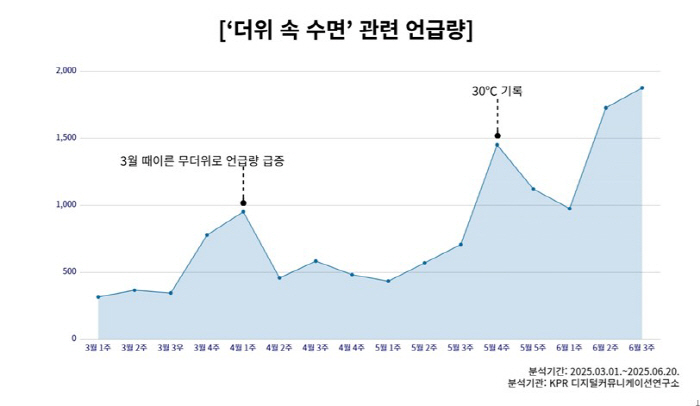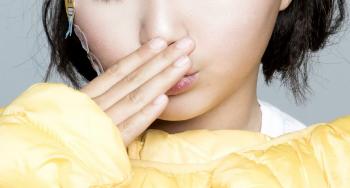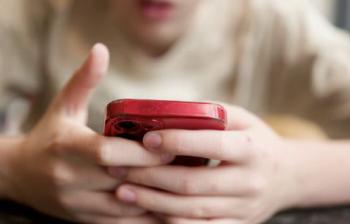The prolonged heat wave...Demand for products and services to improve sleep environment for good sleep ↑
The demand for improvement of the sleeping environment is increasing as the summer is prolonged and heat waves and tropical nights are intensifying due to recent climate change.
According to the Korea Meteorological Administration, the average number of heatwave days nationwide in 2024 was 24.0 days and the number of tropical nights was 20.2. The Korea Meteorological Administration's heat wave day standard is 33 degrees Celsius per day, and tropical nights are days when the minimum temperature at night is 25 degrees Celsius or higher. The number of days that greatly deviate from the appropriate sleep temperature (18-22 degrees Celsius) has increased significantly. In 2024, the average number of heatwave days nationwide was the third highest ever since weather observation, and the number of tropical nights was the highest ever.
In this regard, the KPR Digital Communication Research Institute analyzed 30,000 social big data and found that the amount of references to keywords related to 'summer sleep' increased by about 43% in May compared to March. In particular, keywords related to cool sleep, such as 'cold blanket', 'tropical night', 'cooling products', and 's sleep routine', have risen sharply since mid-May, revealing signs of the spread of the summer sleep market in earnest.
According to the Korea Sleep Industry Association, the size of the domestic Sleeponomics market, which was 480 billion won in 2011, exceeded 3 trillion won as of 2021. Global Market Insights predicted that the global sleep tech market will reach $32.1 billion (45 trillion won) in 2026.
Accordingly, 'Cool Sleep' products and services to improve the sleep environment are being diversified. In addition to traditional bedding such as cold blankets, cool gel mattresses, and mesh pillows, various cooling interior items such as LED sleeping lights, circulators, and cold curtains are emerging as popular items in summer. In addition, a culture of recommendation is being formed on social media by rapidly spreading late-stage content around hashtags such as '#CoolSleepTem' and '#SummerSleep'.
In addition, the application of Sleep-Tech technology is actively underway. AI-based sleep monitoring apps, smart bands, and automatic temperature control mattresses are equipped with functions to analyze sleep quality and suggest improvement measures by measuring toss and turn, heart rate, and snoring during sleep.
As a result of examining the related words 'SleepTech' through big data analysis, related words related to sleep, such as 'Sleep' and 'Sleep', as well as related words related to the sleeping environment such as 'Temperature' and 'Humidity', and technology related words related to recording the quality of sleep such as 'Pattern', 'Technology', 'Artificial Intelligence' and 'Pattern' appeared.
Personalized marketing cases based on sleep data are also increasing. For example, 's sleep data-driven brand strategy' is expanding, such as recommending supplementary products according to sleep conditions or sending coupons to sleep time, which also has a positive impact on brand reliability.
Kim Eun-yong, director of the KPR Digital Communication Research Institute, said "Sleeping problems in the summer caused by climate change are recognized as problems that are directly connected to health and daily quality beyond simple discomfort."The combination of cool-slip products and sleep tech will be a new benchmark for the summer sleep market in the future, and personalized communication strategies using relevant data will also become more important."
Meanwhile, in a survey conducted by the Organization for Economic Cooperation and Development (OECD), the average daily sleep time of Koreans was 7 hours and 51 minutes in 2021, more than 30 minutes short of the OECD average of 8 hours and 27 minutes. This lack of sleep seems to lead to poor health. According to the National Health Insurance Corporation, the number of sleep disorder patients in Korea increased 28.5% over the past four years from 855,000 in 2018 to 1,098,000 in 2022, and medical expenses increased 86% from 152.6 billion won to 285.1 billion won during the same period.
According to the Korea Meteorological Administration, the average number of heatwave days nationwide in 2024 was 24.0 days and the number of tropical nights was 20.2. The Korea Meteorological Administration's heat wave day standard is 33 degrees Celsius per day, and tropical nights are days when the minimum temperature at night is 25 degrees Celsius or higher. The number of days that greatly deviate from the appropriate sleep temperature (18-22 degrees Celsius) has increased significantly. In 2024, the average number of heatwave days nationwide was the third highest ever since weather observation, and the number of tropical nights was the highest ever.
|
According to the Korea Sleep Industry Association, the size of the domestic Sleeponomics market, which was 480 billion won in 2011, exceeded 3 trillion won as of 2021. Global Market Insights predicted that the global sleep tech market will reach $32.1 billion (45 trillion won) in 2026.
Accordingly, 'Cool Sleep' products and services to improve the sleep environment are being diversified. In addition to traditional bedding such as cold blankets, cool gel mattresses, and mesh pillows, various cooling interior items such as LED sleeping lights, circulators, and cold curtains are emerging as popular items in summer. In addition, a culture of recommendation is being formed on social media by rapidly spreading late-stage content around hashtags such as '#CoolSleepTem' and '#SummerSleep'.
In addition, the application of Sleep-Tech technology is actively underway. AI-based sleep monitoring apps, smart bands, and automatic temperature control mattresses are equipped with functions to analyze sleep quality and suggest improvement measures by measuring toss and turn, heart rate, and snoring during sleep.
As a result of examining the related words 'SleepTech' through big data analysis, related words related to sleep, such as 'Sleep' and 'Sleep', as well as related words related to the sleeping environment such as 'Temperature' and 'Humidity', and technology related words related to recording the quality of sleep such as 'Pattern', 'Technology', 'Artificial Intelligence' and 'Pattern' appeared.
Personalized marketing cases based on sleep data are also increasing. For example, 's sleep data-driven brand strategy' is expanding, such as recommending supplementary products according to sleep conditions or sending coupons to sleep time, which also has a positive impact on brand reliability.
Kim Eun-yong, director of the KPR Digital Communication Research Institute, said "Sleeping problems in the summer caused by climate change are recognized as problems that are directly connected to health and daily quality beyond simple discomfort."The combination of cool-slip products and sleep tech will be a new benchmark for the summer sleep market in the future, and personalized communication strategies using relevant data will also become more important."
Meanwhile, in a survey conducted by the Organization for Economic Cooperation and Development (OECD), the average daily sleep time of Koreans was 7 hours and 51 minutes in 2021, more than 30 minutes short of the OECD average of 8 hours and 27 minutes. This lack of sleep seems to lead to poor health. According to the National Health Insurance Corporation, the number of sleep disorder patients in Korea increased 28.5% over the past four years from 855,000 in 2018 to 1,098,000 in 2022, and medical expenses increased 86% from 152.6 billion won to 285.1 billion won during the same period.
This article was translated by Naver AI translator.




